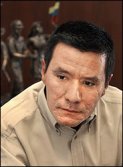The New York Times On Citgo

Citgo Exec Antonio Rivero
Citgo's turmoil has been masked by recent record high oil prices and some of the fattest refining profit margins in history. Citgo's net income increased 42 percent, to $625 million last year, on revenue of $32.3 billion, from $439 million in profit on $25.5 billion of revenue in 2003. (While Citgo does not have publicly traded shares, the company sells its bonds in the United States and files financial statements here.)It appears Citgo's new Venezuelan overlords quickly consolidated power, and may have engaged in an intimidation campaign against American executives to help speed that along:
Mr. Rivero and Mr. Marín, the former chief executive, quickly set about changing the Citgo culture. They brought in some two dozen more Venezuelans, for a total of about 60, who were placed in the executive suite, refineries and human resources, Mr. Marín said.Rivero denies any such campaign, naturally.The two reorganized Citgo's structure into committees, and Mr. Rivero ended up as head of all of them. Decision making slowed considerably. Managers felt paralyzed in their ability to approve what had been routine expenditures.
At one point in 2004, a memo to employees said that no one could pay an invoice without approval from one of the committees, two former Citgo employees said. Mr. Rivero traveled extensively on corporate jets, which by that time had been reserved for use only by Mr. Rivero and Mr. Marín.
In Tulsa, some managers complained about a culture of intimidation. Jim McCarthy, the former vice president for government and public relations, said that files relating to the Venezuelan Embassy began disappearing from a desktop file on his computer, and sometimes reappearing. An internal Citgo investigation could not find a culprit. One night in early 2004, someone "tore up our entire front yard," knocking down trees. Mr. McCarthy filed an insurance claim but never discovered who was responsible. Still, he said, "I was afraid for my family."
Shaken by the incidents, he retired at the end of 2003. "I got the message," he said. "I was no longer wanted there. I was uncomfortable with the leadership and I was in a position to see where things were going." Mr. Rivero denied he ever tried to intimidate Mr. McCarthy but said that Citgo's board members had decided they wanted him out.
Hugo Chavez has as his advisor one Bernard Mommer, who presently leads Citgo's board of directors. He is "a German-born leftist whose writings on oil inspired many Chávez adherents and who has long criticized foreign involvement in Venezuela's oil industry". The obvious danger is that disinvestment and unrealistic expectations of patronage will lead to problems for both Venezuela and the United States.


<< Home